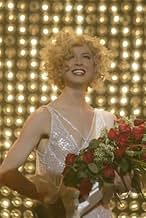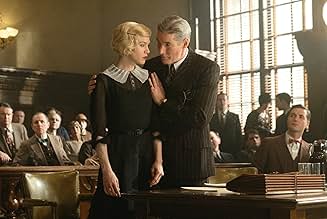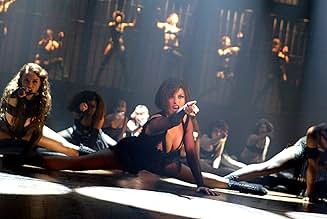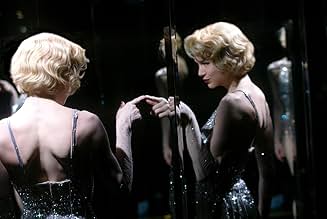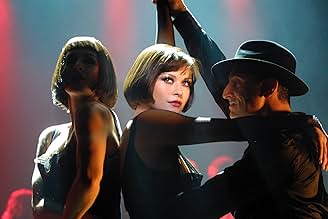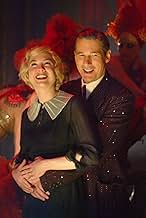अपनी भाषा में प्लॉट जोड़ेंTwo death-row murderesses develop a fierce rivalry while competing for publicity, celebrity, and a sleazy lawyer's attention.Two death-row murderesses develop a fierce rivalry while competing for publicity, celebrity, and a sleazy lawyer's attention.Two death-row murderesses develop a fierce rivalry while competing for publicity, celebrity, and a sleazy lawyer's attention.
- 6 ऑस्कर जीते
- 59 जीत और कुल 129 नामांकन
फ़ीचर्ड समीक्षाएं
Ninety-nine times out of a hundred, Broadway musicals which are heavy on concept translate poorly to film. Live theater relies upon some level of interaction with the audience (as well as some degree of spontaneity), creating an artificial atmosphere that gives a director freedom to use staging and theatrical devices that can make the most of such interaction. By contrast, film creates an illusion of reality that makes such theatrical devices look phony. Rob Marshall's "Chicago" provides the exception to this rule.
To tell the truth, I've never been much of a fan of the stage show. Bob Fosse (with help from John Kander and Fred Ebb) designed the show as a series of vaudeville skits tied together by the flimsiest of books. If you like revues with great choreography, the show worked fine; if you were looking for an actual "musical", you were better advised to look elsewhere. Prior to this film, I'd have thought that you'd also have to look elsewhere to find good material for a film.
Then came Rob Marshall. Conceiving the show as events as seen through Roxie Hart's (Renee Zellweger) imagination, the dance numbers become believable because she truly sees all the world as a stage. In effect, what Marshall has done is substitute Roxie for the theater's live audience and, in the process, made the theatrical touches plausible within the film's context. In doing so, Marshall has relied upon superb editing and choreography to keep up the pace and continuity (such as it is) of the film.
Perhaps the best example of this is "Cell Block Tango," which on stage is a stylized number that is removed from the central action of what book there is. In the film, the number arises from various conversations Roxie has had with other prisoners, focused through her show-biz crazy mind, and puts her own acts in context. Likewise, "They Both Reached for the Gun," played as a ventiloquist act in which her mouthpiece Billy Flynn (Richard Gere) pulls both Roxie's strings and those of the press, and uses Roxie's mind as the filter to point up the ease in which the public can be manipulated.
In choreographing these numbers, Marshall has also done an impressive job. Rather than merely revive Fosse's choreography from the 1975 production, he seems inspired by it to create new choreography that plays off the editing for maximum effect. The two aforementioned numbers are excellent examples of this choreographic technique, as well as "All That Jazz" (intercutting between a vaudeville dance act and two plot threads), "Mr. Cellophane" (beautifully performed by John C. Reilly, as Roxie's schlepp of a husband), "I Can't Do It Alone" and "Razzle Dazzle." Marshall also allows a dose of sanity to slip into the proceedings with a non-musical number, in which a seemingly wrongfully convicted woman is put to death -- the scene slams the brakes for a moment, lest we be completely seduced by the glitter or Roxie's perspective, and lose our own rational perspective on right, wrong and justice. It's a jarring moment, but a responsible (and some may say necessary) one.
The performances are, for the most part, up to the task. Catherine Zeta-Jones richly earned her Oscar as Velma Kelly -- vocally, choreographically, and in the acting department. Gere is also very good (his tap dance number is truly impressive), and John C. Reilly (as Roxie's schlepp husband) and Queen Latifah (as an opportunistic warden) are outstanding. In fact, the weakest performance in the film is Zellweger, and this seems more of a fault of the script than Zellweger. Even though most of the film focuses on her, she remains a cipher at the end of the picture, most likely because the central conceit of the film (Roxie's perception of events) gets in the way of her character development. She still does the best job she can with what she's given with an underwritten part (to be fair, the part is even less well written for the stage version).
Did "Chicago" deserve to beat "Gangs of New York" or "The Pianist" for Best Picture? I'm not sure. All I know is that the film is an incredible achievement given its source material and the natural disadvantages of converting musicals to film. Marshall set out to climb K-2, and he reached the top.
To tell the truth, I've never been much of a fan of the stage show. Bob Fosse (with help from John Kander and Fred Ebb) designed the show as a series of vaudeville skits tied together by the flimsiest of books. If you like revues with great choreography, the show worked fine; if you were looking for an actual "musical", you were better advised to look elsewhere. Prior to this film, I'd have thought that you'd also have to look elsewhere to find good material for a film.
Then came Rob Marshall. Conceiving the show as events as seen through Roxie Hart's (Renee Zellweger) imagination, the dance numbers become believable because she truly sees all the world as a stage. In effect, what Marshall has done is substitute Roxie for the theater's live audience and, in the process, made the theatrical touches plausible within the film's context. In doing so, Marshall has relied upon superb editing and choreography to keep up the pace and continuity (such as it is) of the film.
Perhaps the best example of this is "Cell Block Tango," which on stage is a stylized number that is removed from the central action of what book there is. In the film, the number arises from various conversations Roxie has had with other prisoners, focused through her show-biz crazy mind, and puts her own acts in context. Likewise, "They Both Reached for the Gun," played as a ventiloquist act in which her mouthpiece Billy Flynn (Richard Gere) pulls both Roxie's strings and those of the press, and uses Roxie's mind as the filter to point up the ease in which the public can be manipulated.
In choreographing these numbers, Marshall has also done an impressive job. Rather than merely revive Fosse's choreography from the 1975 production, he seems inspired by it to create new choreography that plays off the editing for maximum effect. The two aforementioned numbers are excellent examples of this choreographic technique, as well as "All That Jazz" (intercutting between a vaudeville dance act and two plot threads), "Mr. Cellophane" (beautifully performed by John C. Reilly, as Roxie's schlepp of a husband), "I Can't Do It Alone" and "Razzle Dazzle." Marshall also allows a dose of sanity to slip into the proceedings with a non-musical number, in which a seemingly wrongfully convicted woman is put to death -- the scene slams the brakes for a moment, lest we be completely seduced by the glitter or Roxie's perspective, and lose our own rational perspective on right, wrong and justice. It's a jarring moment, but a responsible (and some may say necessary) one.
The performances are, for the most part, up to the task. Catherine Zeta-Jones richly earned her Oscar as Velma Kelly -- vocally, choreographically, and in the acting department. Gere is also very good (his tap dance number is truly impressive), and John C. Reilly (as Roxie's schlepp husband) and Queen Latifah (as an opportunistic warden) are outstanding. In fact, the weakest performance in the film is Zellweger, and this seems more of a fault of the script than Zellweger. Even though most of the film focuses on her, she remains a cipher at the end of the picture, most likely because the central conceit of the film (Roxie's perception of events) gets in the way of her character development. She still does the best job she can with what she's given with an underwritten part (to be fair, the part is even less well written for the stage version).
Did "Chicago" deserve to beat "Gangs of New York" or "The Pianist" for Best Picture? I'm not sure. All I know is that the film is an incredible achievement given its source material and the natural disadvantages of converting musicals to film. Marshall set out to climb K-2, and he reached the top.
Funny thing about watching a movie like "Chicago", which won the award for Best Picture last year. I eagerly awaited the DVD, and when I first sat down to watch it, I didn't finish it. I guess I just wasn't in the mood. I began to wonder what all the hoopla was about. Now, a couple of weeks later, I watched it from the beginning and now I "get" it. I must have been in a different mood, because this time everything "clicked" for me, it was great fun, simply a very entertaining movie. Now I'm glad I own the DVD, aside from my desire to have as many Oscar winners as I can. The whole story is a parody of fame, crime, and use of a slick lawyer to fool a jury. I will enjoy watching it again and again.
My favorite scene was where Gere's lawyer was puppetteer to Zellweger's Roxie, the acting, the singing, the timing were all just perfect. It has been well-publicized that Zellweger neither sang nor danced professionally before "Chicago", and I found her more than adequate for the role of Roxie. In fact, I quite enjoy her singing voice.
(Afterwards I retrieved my old grandma's crystal ball, rubbed it then gazed into it and saw, Renee Zellweger will win the best actress Oscar for her performance in the 2019 movie "Judy" where she plays Judy Garland and does all her own singing of Garland songs.)
Still, Catherine Z-J has the more powerful, trained voice, having started out on stage, and it is apparent when they are together that Z-J is the more seasoned performer.
I was very pleasantly surprised at how well Gere handled his singing duties. Some have complained about his somewhat "nasal" singing voice, but to me it fit his character well. A rich, operatic baritone would have been out of character.
I viewed the DVD with the DTS track selected and it delivers with a fine surround sound. Plus, the picture is very sharp, in all a good DVD to own for fans of musical comedies.
NOV 2024 edit: Watching this movie never gets old.
My favorite scene was where Gere's lawyer was puppetteer to Zellweger's Roxie, the acting, the singing, the timing were all just perfect. It has been well-publicized that Zellweger neither sang nor danced professionally before "Chicago", and I found her more than adequate for the role of Roxie. In fact, I quite enjoy her singing voice.
(Afterwards I retrieved my old grandma's crystal ball, rubbed it then gazed into it and saw, Renee Zellweger will win the best actress Oscar for her performance in the 2019 movie "Judy" where she plays Judy Garland and does all her own singing of Garland songs.)
Still, Catherine Z-J has the more powerful, trained voice, having started out on stage, and it is apparent when they are together that Z-J is the more seasoned performer.
I was very pleasantly surprised at how well Gere handled his singing duties. Some have complained about his somewhat "nasal" singing voice, but to me it fit his character well. A rich, operatic baritone would have been out of character.
I viewed the DVD with the DTS track selected and it delivers with a fine surround sound. Plus, the picture is very sharp, in all a good DVD to own for fans of musical comedies.
NOV 2024 edit: Watching this movie never gets old.
Yes, you may be sceptical of the casting if you saw it, but Chicago is a great movie, honestly it is. There is a sharp and witty script, wonderful performances from Catherine Zeta Jones, Renee Zellwegger and Richard Gere and brilliant song and dance routines. The film is stunningly-photographed, and it is not only that the song and dance numbers were great, but also how cleverly they were incorporated into the story, which was a fantastic idea. The costumes are also fabulous, and I thought Catherine Zeta Jones was hot as Velma. Richard Gere is his usual charming self, and Renee Zellwegger lights up the screen even if her character is rather dim-witted. The film is a little long, but I think this is a witty and naughty movie, that is absolutely fantastic in every meaning of the word, and I don't get the negative criticisms. 9.5/10 Bethany Cox
You've been collared for a crime you did commit, one of your lovers took the bullet, when he bit, now your cast inside a cell, things not looking very swell, with all the other girls, who just, didn't, do it. As luck would have it Billy Flynn will take your case, for a fee, he'll make the charges a disgrace, by painting a depiction, conjured mainly on a fiction, just present a face with innocence and grace.
It's one of the best cinematic musicals, with a superb translation from stage to screen that immediately gets you looking for theatrical performance tickets once the titles roll. The performances are sublime, the songs and lyrics superb, and the joy you walk away with overwhelming.
It's one of the best cinematic musicals, with a superb translation from stage to screen that immediately gets you looking for theatrical performance tickets once the titles roll. The performances are sublime, the songs and lyrics superb, and the joy you walk away with overwhelming.
Fictional characters, as a whole, get away with more than is permissible in reality. They do things we would never condone in our peers, yet still manage to elicit our sympathy. Maybe it's a form of catharsis--instead of inflicting violence on other people, we watch someone onscreen do so and cheer them on. Such is the case with "Chicago"--the film features a large rogue's gallery of criminals, con men, and crooks, yet most of these are surprisingly likeable. And yet, the urge to root for the bad guys is somewhat unsettling, for "Chicago" is a story about people beating the rap by manipulating the public, illiciting their sympathy and playing on their deep-seated need for the bizarre and bloody.
Told one way, the story of "Chicago" sounds like a showbusiness drama: a young girl dreams of stardom. She is initailly naive but learns quickly, rising into the blaze of limelight while an older, more experienced rival resents the new face that's stealing the show. The twist is that the art is murder, and the stage is comprised of the papers, the radio, the courthouse, and the all-devouring public eye. The veteran is Velma Kelly (Catherine Zeta-Jones), a nightclub singer who did in her husband and sister after finding them in what is usually called "a compromising position." The newcomer is Roxie Hart (Renee Zelweiger), a cutie-pie who shot her lover after finding out he was using her, and who expects her husband Amos (John C. Reilly, excellent as the quintessentail doormat) to stand by her afterwards. Both women are represented by Billy Flynn (Richard Gere), who brags he can beat any rap for the right price and is probably what Shakespeare had in mind when he made that crack about killing all the lawyers. Flynn's formula is simple: turn the client into a media darling, spin a tragic tale of the good girl ruined by bad choices, and an aquittal is certain.
"Chicago" is a musical, and the film uses a gimmick of establishing two worlds: the real Chicago and a surreal fantasy world in the form of a Jazz-Age theater, where the song and dance takes place. In many musicals this wouldn't work, but here it makes sense. Director Rob Marshall fuses the two worlds together very well, creating images that compliment each other effectively. Some of the concepts look like things you'd see in an editorial cartoon: a press conference becomes a ventroliquist act and puppet show, a trial is depicted as a literal circus. Others offer a reflection of the character's inner self: Amos, in the guise of a baggy-pants comic, bemoans the fact that, like all second banannas, nobody really notices him--even the fantasy audience seems indifferent to his performance (which is, in truth, wonderful).
The ensemble all turns in excellent performances in the acting category, but the singing is more uneven. Zeta-Jones has by far the best voice of the leads, as exemplified by the casually sensual "All That Jazz." Zelweiger is passable, mostly because one gets the impression that her Roxie has more charm and determination than actual talent. Gere only barely manages with the music, and does so mainly on the grounds that Billy Flynn isn't one of the more vocally difficult roles in the music theater cannon. But what he lacks in pipes he makes up for in the character department: his Flynn is a perfectly charismatic scoundrel, one whose talent and danger is in his ability to be so charming. Taye Diggs, who presides over the dream world as the Bandleader, doesn't get to sing, which is a shame because he can--he was in the original cast of "Rent"--but works very well with what he's given.
The mix of glitter and grime in "Chicago" is reminicent of last year's "Moulin Rouge," but those who thought the latter too excessive will probably find this one more appealing. Any fan of music theater, however, will not want to miss this film--it may just be the rebirth of the movie musical we've been hearing about.
Told one way, the story of "Chicago" sounds like a showbusiness drama: a young girl dreams of stardom. She is initailly naive but learns quickly, rising into the blaze of limelight while an older, more experienced rival resents the new face that's stealing the show. The twist is that the art is murder, and the stage is comprised of the papers, the radio, the courthouse, and the all-devouring public eye. The veteran is Velma Kelly (Catherine Zeta-Jones), a nightclub singer who did in her husband and sister after finding them in what is usually called "a compromising position." The newcomer is Roxie Hart (Renee Zelweiger), a cutie-pie who shot her lover after finding out he was using her, and who expects her husband Amos (John C. Reilly, excellent as the quintessentail doormat) to stand by her afterwards. Both women are represented by Billy Flynn (Richard Gere), who brags he can beat any rap for the right price and is probably what Shakespeare had in mind when he made that crack about killing all the lawyers. Flynn's formula is simple: turn the client into a media darling, spin a tragic tale of the good girl ruined by bad choices, and an aquittal is certain.
"Chicago" is a musical, and the film uses a gimmick of establishing two worlds: the real Chicago and a surreal fantasy world in the form of a Jazz-Age theater, where the song and dance takes place. In many musicals this wouldn't work, but here it makes sense. Director Rob Marshall fuses the two worlds together very well, creating images that compliment each other effectively. Some of the concepts look like things you'd see in an editorial cartoon: a press conference becomes a ventroliquist act and puppet show, a trial is depicted as a literal circus. Others offer a reflection of the character's inner self: Amos, in the guise of a baggy-pants comic, bemoans the fact that, like all second banannas, nobody really notices him--even the fantasy audience seems indifferent to his performance (which is, in truth, wonderful).
The ensemble all turns in excellent performances in the acting category, but the singing is more uneven. Zeta-Jones has by far the best voice of the leads, as exemplified by the casually sensual "All That Jazz." Zelweiger is passable, mostly because one gets the impression that her Roxie has more charm and determination than actual talent. Gere only barely manages with the music, and does so mainly on the grounds that Billy Flynn isn't one of the more vocally difficult roles in the music theater cannon. But what he lacks in pipes he makes up for in the character department: his Flynn is a perfectly charismatic scoundrel, one whose talent and danger is in his ability to be so charming. Taye Diggs, who presides over the dream world as the Bandleader, doesn't get to sing, which is a shame because he can--he was in the original cast of "Rent"--but works very well with what he's given.
The mix of glitter and grime in "Chicago" is reminicent of last year's "Moulin Rouge," but those who thought the latter too excessive will probably find this one more appealing. Any fan of music theater, however, will not want to miss this film--it may just be the rebirth of the movie musical we've been hearing about.
Oscars Best Picture Winners, Ranked
Oscars Best Picture Winners, Ranked
See the complete list of Oscars Best Picture winners, ranked by IMDb ratings.
क्या आपको पता है
- ट्रिवियाIn the beginning of the scene introducing Matron Mama Morton (Queen Latifah) to the new inmates, Roxie Hart (Renée Zellweger) has a brief conversation with a woman smoking a cigarette. That character is played by long-time Broadway actress Chita Rivera, who portrayed Velma Kelly in the original 1975 production of "Chicago."
- गूफ़There are 50 stars on the US flag in the courtroom (should be 48).
- भाव
June: I'm standin' in the kitchen, carving up a chicken for dinner, minding my own business, when in storms my husband, Wilbur, in a jealous rage. "You've been screwing the milkman," he said. He was crazy, and he kept on screaming, "You've been screwing the milkman." And then he ran into my knife... he ran into my knife ten times.
- क्रेज़ी क्रेडिटNear the end of the credits, just so there are no doubts: Catherine Zeta-Jones' singing and dancing performed by Catherine Zeta-Jones Renée Zellweger's singing and dancing performed by Renée Zellweger Richard Gere's singing and dancing performed by Richard Gere
- इसके अलावा अन्य वर्जनThe musical number "Class," featuring Queen Latifah and Catherine Zeta-Jones, was deleted from the final version of the film. However, it was recut into the movie for a brief, extremely limited theatrical re-release in the summer of 2003. It then appeared on DVD as a bonus feature, but was NOT intercut there.
- साउंडट्रैकOverture/And All That Jazz
Music by John Kander
Lyrics by Fred Ebb
Performed by Catherine Zeta-Jones, Renée Zellweger, and Taye Diggs
Published by Unichappell Music, Inc. (BMI)
टॉप पसंद
रेटिंग देने के लिए साइन-इन करें और वैयक्तिकृत सुझावों के लिए वॉचलिस्ट करें
विवरण
- रिलीज़ की तारीख़
- कंट्री ऑफ़ ओरिजिन
- आधिकारिक साइटें
- भाषाएं
- इस रूप में भी जाना जाता है
- Chicago: The Musical
- फ़िल्माने की जगहें
- Ontario Legislature Building, Queen's Park, टोरोंटो, ओंटेरियो, कनाडा(as courthouse steps for press conference)
- उत्पादन कंपनियां
- IMDbPro पर और कंपनी क्रेडिट देखें
बॉक्स ऑफ़िस
- बजट
- $4,50,00,000(अनुमानित)
- US और कनाडा में सकल
- $17,06,87,518
- US और कनाडा में पहले सप्ताह में कुल कमाई
- $20,74,929
- 29 दिस॰ 2002
- दुनिया भर में सकल
- $30,67,77,366
- चलने की अवधि1 घंटा 53 मिनट
- रंग
- ध्वनि मिश्रण
- पक्ष अनुपात
- 1.85 : 1
इस पेज में योगदान दें
किसी बदलाव का सुझाव दें या अनुपलब्ध कॉन्टेंट जोड़ें








